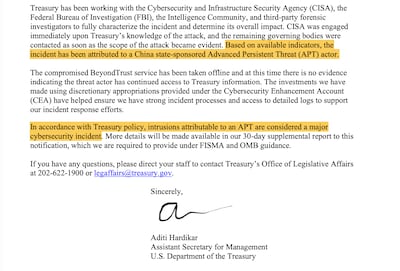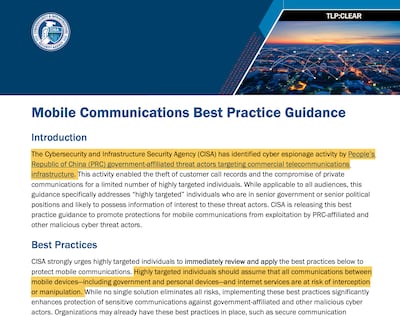After unclassified documents from the US Treasury Department were accessed in a hack blamed on China, many in the cybersecurity community are wondering how such breaches might intensify in the weeks and months ahead.
“I know a lot of cybersecurity vendors are now worried about getting hit themselves,” said a media-relations professional with various technology clients. “As a result, they’re taking the line of not jumping on top of someone else’s misfortune.”
The Treasury Department sent a letter to US senators on Monday saying that third-party software provider BeyondTrust had disclosed that a “threat actor” gained “access to a key used by the vendor to secure a cloud-based service used to remotely provide technical support for Treasury Departmental Offices end users”.
In a statement provided to The National, BeyondTrust said that it had notified a limited number of customers who were affected, and that it has been working to support the customers since then.
“BeyondTrust previously identified and took measures to address a security incident in early December 2024 that involved the Remote Support product,” read the statement. It added that only the company's Remote Support product had been compromised.
“Law enforcement was notified and BeyondTrust has been supporting the investigative efforts.”
The company also said it had posted an entire timeline of the hack and would continue updating affected customers.
China has repeatedly denied involvement in the hacking, with a Foreign Ministry representative saying that the accusations were “groundless” and “lacking evidence”.
According to the letter from the Treasury Department, through the “key”, the hacker was able to gain access to certain government workstations – with that access limited to unclassified documents.
“The analogy is a hacker breaks into your plumber's office and steals master keys to the buildings they service,” John Scott-Railton, a senior researcher with Citizen Lab, an interdisciplinary technology research lab based at the University of Toronto, wrote on X.
“Given BeyondTrust's big client list, makes one wonder if other customers were targeted,” he added, referring to clients such as Williams Sonoma, Carbonite, IHG Hotels and Resorts, Wynn Resorts and ServiceNow.
Heightened awareness due to Salt Typhoon cyber attack
The recent compromise of the Treasury Department comes weeks after what has become known as the Salt Typhoon cyber breach, flagged by US cybersecurity officials in early December.
In that particular breach, Washington agencies accused China of sponsoring an attack that infiltrated at least nine US communications companies and potentially left American consumers vulnerable.
As a result of Salt Typhoon and other recent accusations against China-based hackers, the Cybersecurity and Infrastructure Security Agency, issued guidance for “highly targeted individuals” in the US to protect their mobile devices and personal communication computer systems.
“Use only end-to-end encrypted communications,” reads one of the guidance suggestions from CISA in the long list compiled by the agency. “Migrate away from short message service-based multi factor authorisation,” reads another on the list, which also has specific instructions for iPhone and Android platform users.
Ongoing technology tension between US and China
In early December during a panel discussion hosted by the Centre for Strategic and International Studies, Kara Frederick, director of the tech policy centre for The Heritage Foundation, a conservative think tank, spoke about an increasingly problematic national security outlook when it comes to China, and that US tech companies needed to scale back efforts in the country.
“US big tech companies are going to have to pick a flag, and it should be the stars and bars and not China. I think the Trump administration will wake these companies up to that,” she said.
In a recent video posted by the select committee on the Chinese Communist Party, Republican Representative John Moolenaar did not mince words about tension between the US and China over technology.
“The select committee has made incredible progress in combating China's maligned influence within the United States,” Mr Moolenaar said, pointing out the recent bill that seeks to ban TikTok in the US due to national security concerns.
That bill is being challenged by ByteDance, the Beijing-based owner of TikTok, in the US Supreme Court, which will hear legal arguments from the company that is hoping to keep the social media platform operating in the US.
“With steadfast support from both [House Speaker Mike Johnson and minority leader Hakeem Jeffries] I look forward to continuing to lead this excellent group of lawmakers for another two years in continuing our bipartisan work to stand up to the Chinese Communist Party to protect American interests at home and abroad,” said Mr Moolenaar.
How to join and use Abu Dhabi’s public libraries
• There are six libraries in Abu Dhabi emirate run by the Department of Culture and Tourism, including one in Al Ain and Al Dhafra.
• Libraries are free to visit and visitors can consult books, use online resources and study there. Most are open from 8am to 8pm on weekdays, closed on Fridays and have variable hours on Saturdays, except for Qasr Al Watan which is open from 10am to 8pm every day.
• In order to borrow books, visitors must join the service by providing a passport photograph, Emirates ID and a refundable deposit of Dh400. Members can borrow five books for three weeks, all of which are renewable up to two times online.
• If users do not wish to pay the fee, they can still use the library’s electronic resources for free by simply registering on the website. Once registered, a username and password is provided, allowing remote access.
• For more information visit the library network's website.
SPEC%20SHEET%3A%20NOTHING%20PHONE%20(2)
%3Cp%3E%3Cstrong%3EDisplay%3A%3C%2Fstrong%3E%206.7%E2%80%9D%20LPTO%20Amoled%2C%202412%20x%201080%2C%20394ppi%2C%20HDR10%2B%2C%20Corning%20Gorilla%20Glass%3C%2Fp%3E%0A%3Cp%3E%3Cstrong%3EProcessor%3A%3C%2Fstrong%3E%20Qualcomm%20Snapdragon%208%2B%20Gen%202%2C%20octa-core%3B%20Adreno%20730%20GPU%3C%2Fp%3E%0A%3Cp%3E%3Cstrong%3EMemory%3A%3C%2Fstrong%3E%208%2F12GB%3C%2Fp%3E%0A%3Cp%3E%3Cstrong%3ECapacity%3A%3C%2Fstrong%3E%20128%2F256%2F512GB%3C%2Fp%3E%0A%3Cp%3E%3Cstrong%3EPlatform%3A%3C%2Fstrong%3E%20Android%2013%2C%20Nothing%20OS%202%3C%2Fp%3E%0A%3Cp%3E%3Cstrong%3EMain%20camera%3A%3C%2Fstrong%3E%20Dual%2050MP%20wide%2C%20f%2F1.9%20%2B%2050MP%20ultrawide%2C%20f%2F2.2%3B%20OIS%2C%20auto-focus%3C%2Fp%3E%0A%3Cp%3E%3Cstrong%3EMain%20camera%20video%3A%3C%2Fstrong%3E%204K%20%40%2030%2F60fps%2C%201080p%20%40%2030%2F60fps%3B%20live%20HDR%2C%20OIS%3C%2Fp%3E%0A%3Cp%3E%3Cstrong%3EFront%20camera%3A%3C%2Fstrong%3E%2032MP%20wide%2C%20f%2F2.5%2C%20HDR%3C%2Fp%3E%0A%3Cp%3E%3Cstrong%3EFront%20camera%20video%3A%3C%2Fstrong%3E%20Full-HD%20%40%2030fps%3C%2Fp%3E%0A%3Cp%3E%3Cstrong%3EBattery%3A%3C%2Fstrong%3E%204700mAh%3B%20full%20charge%20in%2055m%20w%2F%2045w%20charger%3B%20Qi%20wireless%2C%20dual%20charging%3C%2Fp%3E%0A%3Cp%3E%3Cstrong%3EConnectivity%3A%3C%2Fstrong%3E%20Wi-Fi%2C%20Bluetooth%205.3%2C%20NFC%20(Google%20Pay)%3C%2Fp%3E%0A%3Cp%3E%3Cstrong%3EBiometrics%3A%3C%2Fstrong%3E%20Fingerprint%2C%20face%20unlock%3C%2Fp%3E%0A%3Cp%3E%3Cstrong%3EI%2FO%3A%3C%2Fstrong%3E%20USB-C%3C%2Fp%3E%0A%3Cp%3E%3Cstrong%3EDurability%3A%3C%2Fstrong%3E%20IP54%2C%20limited%20protection%3C%2Fp%3E%0A%3Cp%3E%3Cstrong%3ECards%3A%3C%2Fstrong%3E%20Dual-nano%20SIM%3C%2Fp%3E%0A%3Cp%3E%3Cstrong%3EColours%3A%3C%2Fstrong%3E%20Dark%20grey%2C%20white%3C%2Fp%3E%0A%3Cp%3E%3Cstrong%3EIn%20the%20box%3A%3C%2Fstrong%3E%20Nothing%20Phone%20(2)%2C%20USB-C-to-USB-C%20cable%3C%2Fp%3E%0A%3Cp%3E%3Cstrong%3EPrice%20(UAE)%3A%3C%2Fstrong%3E%20Dh2%2C499%20(12GB%2F256GB)%20%2F%20Dh2%2C799%20(12GB%2F512GB)%3C%2Fp%3E%0A
The specs
Price, base / as tested Dh12 million
Engine 8.0-litre quad-turbo, W16
Gearbox seven-speed dual clutch auto
Power 1479 @ 6,700rpm
Torque 1600Nm @ 2,000rpm 0-100kph: 2.6 seconds 0-200kph: 6.1 seconds
Top speed 420 kph (governed)
Fuel economy, combined 35.2L / 100km (est)
AIDA%20RETURNS
%3Cp%3E%3Cstrong%3EDirector%3A%20%3C%2Fstrong%3ECarol%20Mansour%3C%2Fp%3E%0A%3Cp%3E%3Cstrong%3EStarring%3A%20%3C%2Fstrong%3EAida%20Abboud%2C%20Carol%20Mansour%3C%2Fp%3E%0A%3Cp%3E%3Cstrong%3ERating%3A%3C%2Fstrong%3E%203.5.%2F5%3C%2Fp%3E%0A
Ten tax points to be aware of in 2026
1. Domestic VAT refund amendments: request your refund within five years
If a business does not apply for the refund on time, they lose their credit.
2. E-invoicing in the UAE
Businesses should continue preparing for the implementation of e-invoicing in the UAE, with 2026 a preparation and transition period ahead of phased mandatory adoption.
3. More tax audits
Tax authorities are increasingly using data already available across multiple filings to identify audit risks.
4. More beneficial VAT and excise tax penalty regime
Tax disputes are expected to become more frequent and more structured, with clearer administrative objection and appeal processes. The UAE has adopted a new penalty regime for VAT and excise disputes, which now mirrors the penalty regime for corporate tax.
5. Greater emphasis on statutory audit
There is a greater need for the accuracy of financial statements. The International Financial Reporting Standards standards need to be strictly adhered to and, as a result, the quality of the audits will need to increase.
6. Further transfer pricing enforcement
Transfer pricing enforcement, which refers to the practice of establishing prices for internal transactions between related entities, is expected to broaden in scope. The UAE will shortly open the possibility to negotiate advance pricing agreements, or essentially rulings for transfer pricing purposes.
7. Limited time periods for audits
Recent amendments also introduce a default five-year limitation period for tax audits and assessments, subject to specific statutory exceptions. While the standard audit and assessment period is five years, this may be extended to up to 15 years in cases involving fraud or tax evasion.
8. Pillar 2 implementation
Many multinational groups will begin to feel the practical effect of the Domestic Minimum Top-Up Tax (DMTT), the UAE's implementation of the OECD’s global minimum tax under Pillar 2. While the rules apply for financial years starting on or after January 1, 2025, it is 2026 that marks the transition to an operational phase.
9. Reduced compliance obligations for imported goods and services
Businesses that apply the reverse-charge mechanism for VAT purposes in the UAE may benefit from reduced compliance obligations.
10. Substance and CbC reporting focus
Tax authorities are expected to continue strengthening the enforcement of economic substance and Country-by-Country (CbC) reporting frameworks. In the UAE, these regimes are increasingly being used as risk-assessment tools, providing tax authorities with a comprehensive view of multinational groups’ global footprints and enabling them to assess whether profits are aligned with real economic activity.
Contributed by Thomas Vanhee and Hend Rashwan, Aurifer
Timeline
2012-2015
The company offers payments/bribes to win key contracts in the Middle East
May 2017
The UK SFO officially opens investigation into Petrofac’s use of agents, corruption, and potential bribery to secure contracts
September 2021
Petrofac pleads guilty to seven counts of failing to prevent bribery under the UK Bribery Act
October 2021
Court fines Petrofac £77 million for bribery. Former executive receives a two-year suspended sentence
December 2024
Petrofac enters into comprehensive restructuring to strengthen the financial position of the group
May 2025
The High Court of England and Wales approves the company’s restructuring plan
July 2025
The Court of Appeal issues a judgment challenging parts of the restructuring plan
August 2025
Petrofac issues a business update to execute the restructuring and confirms it will appeal the Court of Appeal decision
October 2025
Petrofac loses a major TenneT offshore wind contract worth €13 billion. Holding company files for administration in the UK. Petrofac delisted from the London Stock Exchange
November 2025
180 Petrofac employees laid off in the UAE
Who's who in Yemen conflict
Houthis: Iran-backed rebels who occupy Sanaa and run unrecognised government
Yemeni government: Exiled government in Aden led by eight-member Presidential Leadership Council
Southern Transitional Council: Faction in Yemeni government that seeks autonomy for the south
Habrish 'rebels': Tribal-backed forces feuding with STC over control of oil in government territory
Company%20Profile
%3Cp%3E%3Cstrong%3ECompany%20name%3A%20%3C%2Fstrong%3ENamara%0D%3Cbr%3E%3Cstrong%3EStarted%3A%20%3C%2Fstrong%3EJune%202022%0D%3Cbr%3E%3Cstrong%3EFounder%3A%20%3C%2Fstrong%3EMohammed%20Alnamara%0D%3Cbr%3E%3Cstrong%3EBased%3A%20%3C%2Fstrong%3EDubai%20%0D%3Cbr%3E%3Cstrong%3ESector%3A%20%3C%2Fstrong%3EMicrofinance%0D%3Cbr%3E%3Cstrong%3ECurrent%20number%20of%20staff%3A%20%3C%2Fstrong%3E16%0D%3Cbr%3E%3Cstrong%3EInvestment%20stage%3A%20%3C%2Fstrong%3ESeries%20A%0D%3Cbr%3E%3Cstrong%3EInvestors%3A%20%3C%2Fstrong%3EFamily%20offices%0D%3Cbr%3E%3C%2Fp%3E%0A
Getting there
Flydubai flies direct from Dubai to Tbilisi from Dh1,025 return including taxes
WE%20NO%20LONGER%20PREFER%20MOUNTAINS
%3Cp%3E%3Cstrong%3EDirector%3A%3C%2Fstrong%3E%20Inas%20Halabi%3C%2Fp%3E%0A%3Cp%3E%3Cstrong%3EStarring%3A%20%3C%2Fstrong%3ENijmeh%20Hamdan%2C%20Kamal%20Kayouf%2C%20Sheikh%20Najib%20Alou%3C%2Fp%3E%0A%3Cp%3E%3Cstrong%3ERating%3A%3C%2Fstrong%3E%204%2F5%3C%2Fp%3E%0A
In numbers
- Number of children under five will fall from 681 million in 2017 to 401m in 2100
- Over-80s will rise from 141m in 2017 to 866m in 2100
- Nigeria will become the world’s second most populous country with 791m by 2100, behind India
- China will fall dramatically from a peak of 2.4 billion in 2024 to 732 million by 2100
- an average of 2.1 children per woman is required to sustain population growth
Paatal Lok season two
Directors: Avinash Arun, Prosit Roy
Stars: Jaideep Ahlawat, Ishwak Singh, Lc Sekhose, Merenla Imsong
Rating: 4.5/5
Company Profile
Company name: Big Farm Brothers
Started: September 2020
Founders: Vishal Mahajan and Navneet Kaur
Based: Dubai Investment Park 1
Industry: food and agriculture
Initial investment: $205,000
Current staff: eight to 10
Future plan: to expand to other GCC markets
WHAT IS A BLACK HOLE?
1. Black holes are objects whose gravity is so strong not even light can escape their pull
2. They can be created when massive stars collapse under their own weight
3. Large black holes can also be formed when smaller ones collide and merge
4. The biggest black holes lurk at the centre of many galaxies, including our own
5. Astronomers believe that when the universe was very young, black holes affected how galaxies formed
Avatar: Fire and Ash
Director: James Cameron
Starring: Sam Worthington, Sigourney Weaver, Zoe Saldana
Rating: 4.5/5




